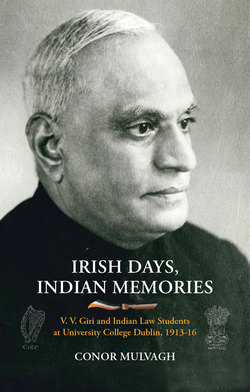Читать книгу Irish Days, Indian Memories - Conor Mulvagh - Страница 10
На сайте Литреса книга снята с продажи.
ОглавлениеFOREWORD
I was all of nine years studying at an Irish Catholic school when I first started thinking about the name Giri. In school, as well as public functions and social get-togethers, I would be referred to as Giri’s grandson.
As I grew up, I realised I had been born into a political family and Giri was a household name in most parts of India. In the 1950s and 60s, many recognised Giri as India’s trade union leader, as one who took part in the Quit India Movement, and as one elected to the Constituent Assembly as a Cabinet Minister for Labour in independent India’s first cabinet. To those who were born in the late 1960s and 70s, the name Dr Varahagiri Venkata Giri meant The President of India.
As I entered my teens, I engaged with Giri and asked him several questions on global, national and local issues. His responses, anecdotes and guidance remain today a precious source of my recollections of his student days in Ireland; and those of Giri as a presidential candidate, a politician, a strategist, a nationalist leader, an empathiser with the poor and the industrial workers, a socialist at heart, a pragmatist in achieving his goals, one who spoke well of his opponents, an orator and a family man.
Giri held the view that one of the requisites of a parliamentary system of governance was not just the practice of tolerance but the need to celebrate our differences, particularly in public life. During his presidential campaign and in later years, I vividly recollect his enthusiasm and capacity to connect with several national leaders and political parties. I had the opportunity to closely observe his interaction with those who differed with him on the ways and means of resolving political issues.
Taking risks and espousing a cause came naturally to Giri. His commitment to a cause would be so intense that many a time he would take great risks to achieve his goals. In 1913, when he was just 19 and a student at the University College Dublin he - directly or indirectly - supported the Irish to attain Home Rule. And, at age 75 and much against the advice of political experts and his well-wishers, Giri decided to contest the post of President of India as an independent candidate. Until today, no one has held office as the acting President of India and nor has any independent candidate won in India’s presidential elections. This was a first in the history of Indian politics.
In the early 1900s, a foreign education used to be the birth right of the privileged rich. Today, Indian students have easy access and far greater opportunities to study overseas. This very welcome book by Dr Conor Mulvagh and University College Dublin provides a deep insight into the life and times of Indian students in Ireland at that time, with Giri as its focal point.
While the challenges faced by Indian students today, globally and nationally, are quite different from those faced by Giri and his peers, there is no doubt that those who read this book, particularly Irish and Indian students, will be hugely inspired by Giri’s courage and conviction. He was a student who not only integrated with the Irish people but was totally immersed in their local issues - even politically sensitive issues that may have landed him in prison.
Giri always spoke of the hospitality of the local Irish families during his stay in Dublin. He often mentioned that neither he nor the other Indian students experienced any discrimination or racial prejudice. Possibly somewhere in his mind he compared his situation as a student to that of the experiences of Indian students studying in England in the early 1900s.
Today, members of the student fraternity are possibly overwhelmed with the speed of change. In their daily lives they witness evolutionary and revolutionary changes occurring the world over, not only in the political sphere but more often in the world of technology. Books like Irish Days, Indian Memories may give them an insight into the tough choices some students made in the 1900s as well as the risks and sacrifices they undertook.
Even now when many books on Ireland in 1916 are appearing, there are some that will stand the test of time and remain required reading. Dr Conor Mulvagh’s book is one such account. The more I read through the pages, the more I get to walk down a memory lane laced with anecdotes I heard from my grandfather about Irish-Indian relationships of the past.
Amba Preetham Parigi
Group CEO - Network18
Grandson of former President of India Dr V.V. Giri
December 2015
Mumbai, India
